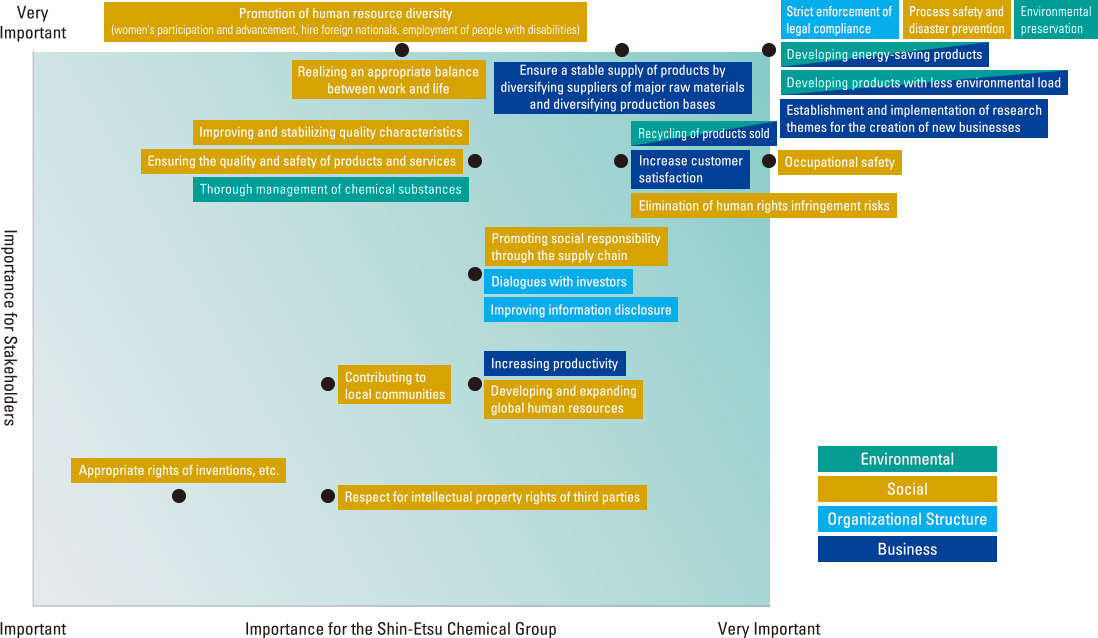Key Sustainability Issues
Key Sustainability Issues
- The foundation of all activities: legal compliance, fair corporate activities
- Health and safety of employees and contractors
- Energy-saving, resource-saving, and reduction of the environmental impacts
- Product quality improvements and product safety control
- Promoting CSR procurement and the diversification of supply sources
- Respect for human rights, the development of human resources, and the promotion of diversity
- Respect for and protection of intellectual property
- Contribution to industry and social initiatives
- Accurate and timely information disclosure and communication with stakeholders
Specifying Key Sustainability Issues
In FY2015, the Sustainability Committee identified “key sustainability issues” that the Shin-Etsu Group needs to focus its efforts on in particular. Subsequently, in December 2018, all of our departments and major domestic Group companies reviewed the key issues and their importance, which were then reviewed again by the Sustainability Committee. As a result, we decided to carry on with the key issues we identified in 2015. We continue to view legal compliance and fair corporate activities as the foundation of all of our activities, and focus on these nine key issues.
Going forward, the Sustainability Committee will continue to review the key issues and their importance as necessary based on the status of the Group’s corporate activities, taking into account changes in the external environment in which the Group operates and trends in sustainability in Japan and overseas.
1. Clarifying key sustainability issues
In December 2015, the committee conducted the following investigations for all of the company's departments and major domestic Group companies.
- The stakeholders for each department and each company are reconfirmed.
- In reference to ISO 26000 core topics, key sustainability issues are listed for each department and each company.
- The level of importance of each key issue for the Group as well as for stakeholders is scored.
2. Creating a scatter plot of key sustainability issues and organizing them
In January 2016, the committee created a scatter plot based on the key issues and the scores submitted by each department and each company. The result showed that the majority of key issues were very important.
The committee organized the listed key issues and created a draft of key sustainability issues that reflects the scatter plot.

3. Interviews with Outside Directors
In January 2016, individual interviews were conducted with all Outside Directors based on the prepared proposal. The followings are the suggestions and opinions from the interviews:
- Compliance with laws and regulations is related to all issues.
- All listed key sustainability issues are equally important to the Group, and it is difficult to prioritize them.
- The Group should clarify its goals while specifying key sustainability issues.
4. Re-examination in the committee and approved by the management
In February 2016, the committee has re-examined the key issues based on the suggestions and opinions of the Outside Directors. The Managing Directors' Meeting, in which all Directors and Audit & Supervisory Board Members are involved in making decisions, also examined the key issues and has declared the items in the figure above to be key sustainability issues of the Group in 2015.
In December 2018, the Sustainability Committee discussed the key issues and their importance, which had been reviewed by all departments of the company and major Group companies in Japan, and decided to continue addressing the key issues identified in 2015.
The Group will work equally on all of these key sustainability issues in no particular order.


